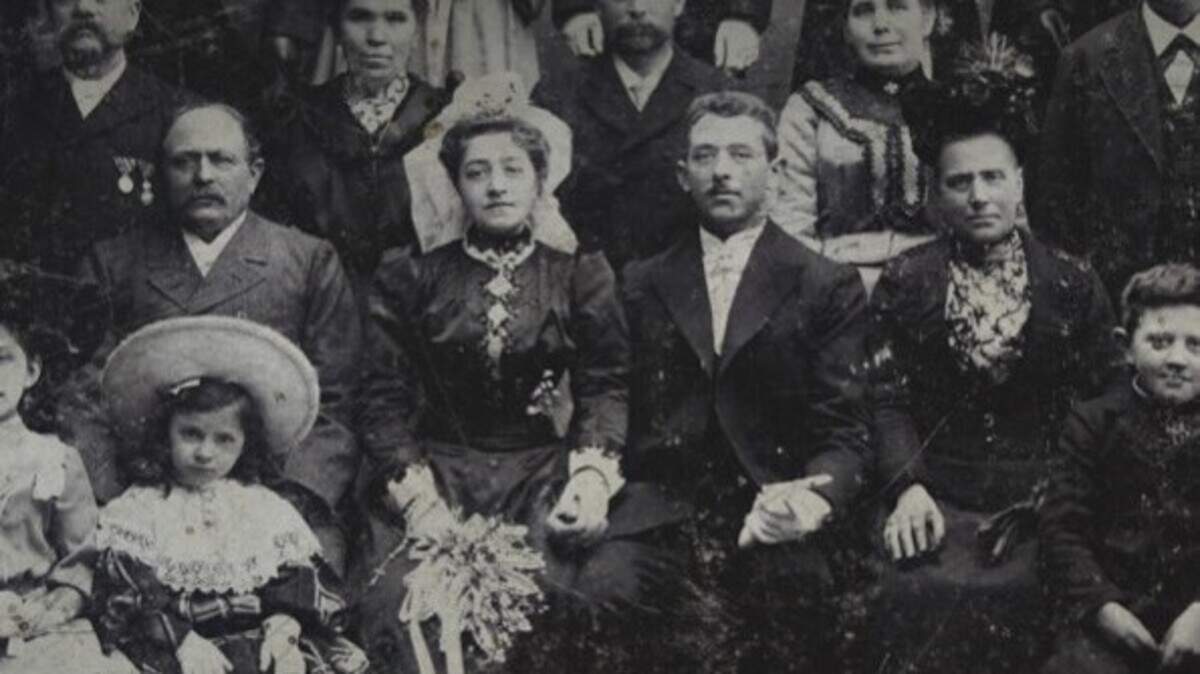A fifty-two minute documentary explores the little known subject of the 638 Luxembourgish citizens who live in Argentina today. These generations are descended from the 1,000 or so Luxembourgers who travelled to the Buenos Aires and Entre Rios provinces to work in agriculture in the 19th century.
The film Lëtzebuerger an Argentinien (Luxembourgers in Argentina), the first ever made in Spanish and Luxembourgish, will be screened with English and French subtitles on Sunday 23 November, at 16:00 at Ciné Utopia.
Intimate interviews and archive material trace the journey of Luxembourgish families who emigrated to Argentina from 1856 to the turn of the 19th century. Over generations, their descendants lost touch with their heritage until a global pandemic unexpectedly rekindled their search for identity.
Daniel Atz (pictured wearing a striped t-shirt) interviewing Luxembourgish descendants living in Argentina © Photo credit: Connaissance Films
“It’s about how identity can fade, but find its way back through memory, migration and the will to reconnect,” said Daniel Atz, the film’s producer and American/Luxembourgish entrepreneur who founded Connaissance Films, the company that made the documentary.
Atz, who also runs LuxCitizenship, which has helped more than 3,000 US citizens gain dual nationality with Luxembourg through ancestry, is himself a descendant whose great grandmother was from Esch-sur-Alzette. He has also lived in Luxembourg.
There are 30,000 Luxembourgish citizens in Brazil, but only 638 in Argentina. Atz started studying the diaspora in Brazil in 2022, and a year later discovered there was a smaller, lesser-known community living in Argentina.
It’s about how identity can fade, but find its way back through memory, migration and the will to reconnect
Daniel Atz
Connaissance Films
He surveyed some of the descendants from the US, Brazil and 120 of those living in Argentina and found “a lot of similarities between Brazil and USA immigrants, but we did not know much about Argentina,” he said.
“We realised this story was so distinct, we decided to make the documentary. Unlike in the USA and Brazil, the oldest descendants in Argentina spoke little or no Luxembourgish and knew nothing at all about Luxembourg.”
“A huge topic in the press”
Between 1856 and 1890, hundreds of Luxembourgers emigrated to Argentina, attracted as agricultural workers who were promised livestock, housing, seeds and even free transportation to the colony. Around 58% came from the Esch and Grevenmacher regions.
The first waves of emigrants had quite a prosperous pathway and settled in the well-known agricultural colony Esperanza in the 1850s.
About 63% emigrated between 1880-89, with an average age of 21 years. “They believed there was a huge possibility, and it was a major topic in the press, with hundreds of articles and letters,” explained Atz.
Archive photos from descendant families sourced by Tom Diederich at Luxembourg’s National Archives © Photo credit: Connaissance Films
Towards the end of the 1880s “Argentinienfieber” (Argentina fever) led to 500 Luxembourgers boarding a ship, emblazoned with the Luxembourg flag. Those on board were headed to the agricultural colony San Antonio de Iraola and had signed colonisation contracts that insisted they give up their native language upon arrival.
Desperate situation for some Luxembourgers
Unfortunately the boom in Argentina collapsed in the 1890s.
“Those that came to San Antonio de Iraola ended up in a desperate situation as what was promised was not there. They made holes in the ground to sleep in.”
Infertile soil, disease, poor housing, and an oppressive loan system run by the local private landowner was waiting for them. The colony collapsed in 1891, leaving the Luxembourgish immigrants stranded. Many moved on to Brazil or the USA, whilst some returned home.
Those that came to San Antonio de Iraola ended up in a desperate situation as what was promised was not there
Daniel Atz
Connaissance Films
Atz and a colleague originally recorded interviews with descendants on their iPhones, covering 1,200km in just five days, but realised they needed a professional team.
By chance, Atz hired Astor Schiantarelli, a cinematographer who was also a Luxembourgish descendant whose family hailed from Schweibach, and who has since moved to Luxembourg.
They were also able to mix the interviews with archive footage and photos from descendant families sourced by Tom Diederich who works at Luxembourg’s National Archives.
Language was lost, traditions faded, and over time many descendants came to believe their ancestors were from Germany rather than Luxembourg
Daniel Atz
Connaissance Films
Atz pointed out that those who made their new life in the pampas faced tremendous hardship: broken promises, harsh conditions, and the gradual erosion of their cultural identity.
“Language was lost, traditions faded, and over time many descendants came to believe their ancestors were from Germany rather than Luxembourg,” said Atz.
Covid-19 pandemic drives search for identity
The film captures an unexpected twist in which the Covid-19 pandemic led some descendants to explore their family trees and uncover long-lost Luxembourgish roots.
“Argentina had a super intense lockdown so people started looking at their roots,” he said, adding that communities formed, citizenship applications were filed, and associations were established across Argentina to celebrate and preserve their rediscovered heritage.
“It’s uncanny how Luxembourgish descendants have found each other. We met a couple who didn’t realise they were both descendants from the Grand Duchy until years after they’d got married.”
Around 51% of dual citizens gained their status in 2022, although only 32% have a Luxembourgish passport, and slightly less have travelled to Luxembourg.
In his survey, Atz discovered that about 70% of descendants were keen to learn Luxembourgish, but those who did move to Europe, have settled mostly in Spain. However those who remain in Argentina still celebrate their cultural roots with annual parades and traditions.
The screening of Lëtzebuerger an Argentinien will be followed by a Q&A with the filmmakers.
